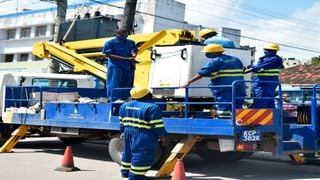
Kenya Power Company employees carry out repairs to a transformer on Haile Selassie Road Mombasa in this photo taken on December 5, 2020.
| Kevin Odit | Nation Media GroupCompanies
Premium
Kenya Power board summoned in EACC tenders probe
The anti-corruption watchdog has summoned non-executive board members of troubled electricity distributor Kenya Power to record statements over a fresh procurement scandal that has rocked that utility company.
In a letter to the Kenya Power board chair Ms Vivienne Yeda seen by the Nation, the Ethics and Anti-Corruption Commission (EACC) boss Twalib Mbarak wants Ms Yeda alongside eight others to appear before its officers between Tuesday and Thursday this week.
“The Commission is investigating allegations of interference in procurement processes by the board of directors,” Mr Mbarak writes in a letter addressed to Ms Yeda dated September 10, 2021.
“To progress the investigation, kindly facilitate the below listed members of the board of directors to appear before our investigators at our Integrity Center offices for interview and statement recording,” the letter reads.
Besides Ms Yeda, the other board members summoned include engineer Abdularaq Ali, Caroline Kittony Njoroge Muhu, Elizabeth Rogo and Kairo Thuo. Others summoned are Mr Sachen Gudka, Isaac Kiva and Humphrey Muhu.
The summons come weeks after the board pushed out the utility’s Chief Executive Officer Benard Ngugi, before the end of his term, after a stormy board meeting in August.
Mr Ngugi was the fourth CEO whose tenure has been cut short at the company in the past four years as the parastatal hopped from one scandal to another.
Kenya Power has been bogged down by several procurement scandals in recent years ranging from faulty meters to over-priced transformers, a billing and power tokens scams. The most recent procurement scandal to erupt at the utility company involved single-sourcing of a public relations company.
After Ms Yeda took over the board last November, she promised to initiate changes to clean the mess left by her predecessors. Ms Yeda, who served as the Director General of East African Development Bank before her appointment to the Kenya power board, said the company’s previous scandals were enabled by a lack of institutional controls.
“The absence of a robust institutional framework created a vacuum, which inevitably was filled by all types (of people) who, for instance, drove Kenya Power into becoming a veritable procurement machine,” Ms Yeda recently told shareholders at the firm's AGM.
Sources at the utility firm say her board has since taken an active role in management, including querying procurement decisions and dropping management’s strategy to increase tariff rates.
The Employment and Labour Relations Court in November 2020 dismissed a petition to remove Mr Ngugi from office due to integrity issues relating to the procurement of transformers when he was the general manager for supply chain.
The petition was dismissed on the basis of a defective affidavit.
Mr Ngugi was one of the few senior managers who remained at the firm after a procurement scandal forced out 10 others, including his predecessor, Ken Tarus.
Mr Tarus, Ben Chumo and other senior managers were in July 2018 charged with abuse of office for allegedly entering into a contract with a private firm for the supply of transformers, which turned out to be faulty.
Prosecutors said the deal also flouted procurement rules for State entities.
This comes at a time when the company is in a deep financial crisis and is unable to meet its obligations, as it walks down a dangerous path to insolvency.
A Treasury document notes that over the past five years, Kenya Power has experienced a general decline in financial performance driven by increasing costs and constrained growth in demand for electricity.
But it points the biggest finger to the take-or-pay pricing model for the power purchase agreements (PPAs) signed with independent power producers (IPPs).
KenGen
These agreements have become a huge burden to the power utility given that they have resulted in fixed capacity charges that become unfavourable to Kenya Power as the off taker irrespective of cheaper alternative source of electricity from KenGen.
Whereas KenGen gives Kenya Power 71.7 per cent of all the energy it distributes, its costs are proportionate to 48.3 per cent. On the contrary, the IPPs -- who only supply 26.5 per cent of power -- account for 47.6 per cent of the costs, in a major rip off for power consumers.
The Treasury has also raised concerns over the huge finance costs and debt portfolio that are weighing down the company.
The monopoly has fallen from a profitable entity that raked in over Sh130 billion in revenues to a loss-making business that is burning all the cash and can now only survive with bailouts from taxpayers.
It currently depends on overdrafts to pay salaries and finance working capital.
Financial challenges
“Kenya Power is facing serious financial challenges and is unable to meet her current obligations to suppliers, lenders and shareholders,” Treasury CS Yatani says in a memo advising the Cabinet on what must be done to rescue the company from imminent collapse.
The Treasury document notes that over the past five years, Kenya Power has experienced a general decline in financial performance driven by increasing costs and constrained growth in demand.
But it points the biggest finger to the take or pay pricing model for the power purchase agreements (PPAs) signed with independent power producers (IPPs).
These agreements have become a huge burden to the power utility given that they have resulted in fixed capacity charges that become unfavourable to Kenya Power as the off taker irrespective of cheaper alternative source of electricity from KenGen.
Whereas KenGen gives Kenya Power 71.7 per cent of all the energy it distributes, its payments are only proportionate to 48.3 per cent of the electricity distributor’s total bills. On the contrary, the IPPs -- who only supply 26.5 per cent of power -- account for 47.6 per cent of the costs, in a major rip off for power consumers.




